Unit 4 Why don't you talk to your parents?Section A(1a-3c)习题课件 2023-2024学年英语人教版八年级下册 (共34张PPT)
文档属性
| 名称 | Unit 4 Why don't you talk to your parents?Section A(1a-3c)习题课件 2023-2024学年英语人教版八年级下册 (共34张PPT) |
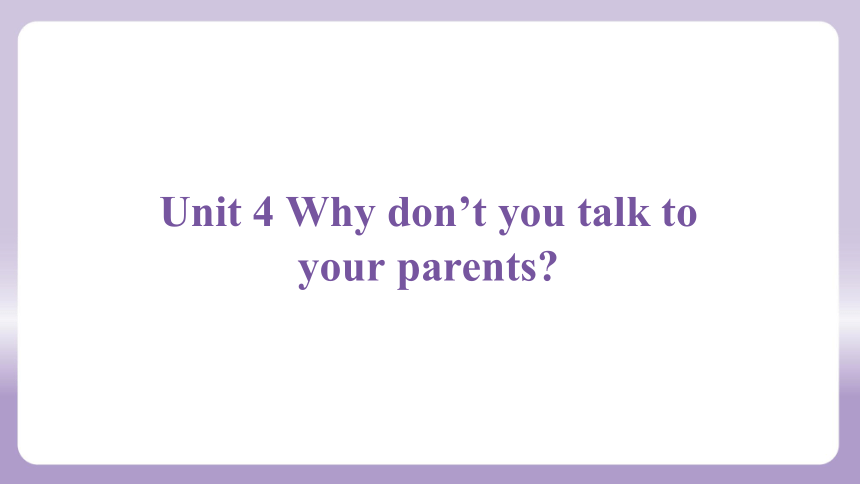
|
|
| 格式 | pptx | ||
| 文件大小 | 403.4KB | ||
| 资源类型 | 教案 | ||
| 版本资源 | 人教新目标(Go for it)版 | ||
| 科目 | 英语 | ||
| 更新时间 | 2024-05-16 22:34:23 | ||
图片预览

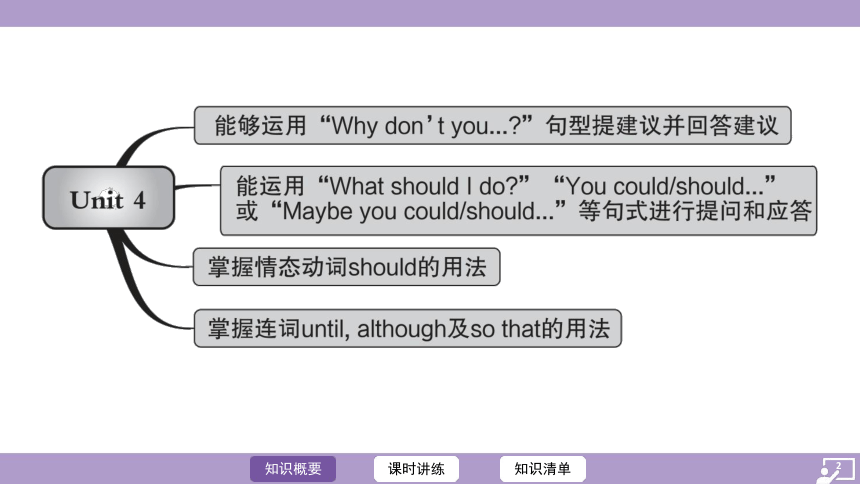
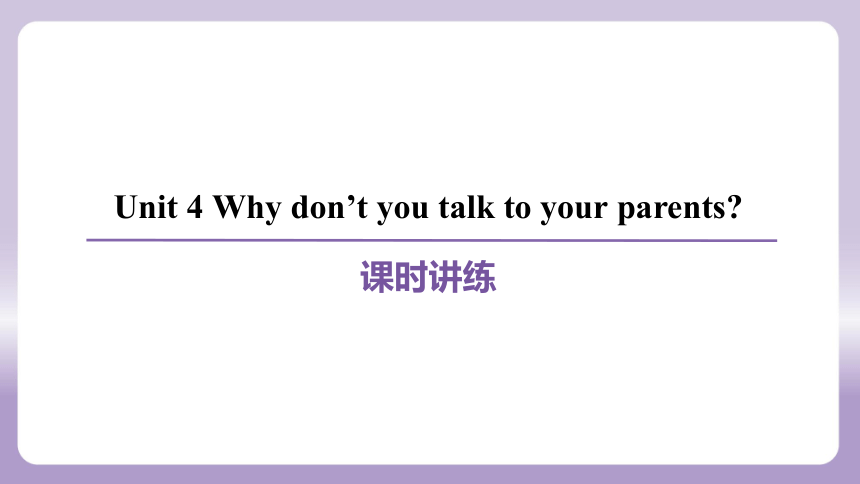
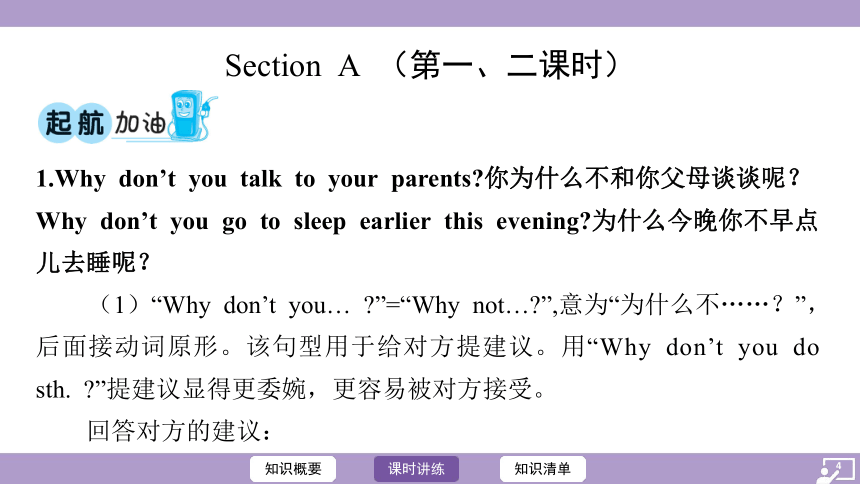



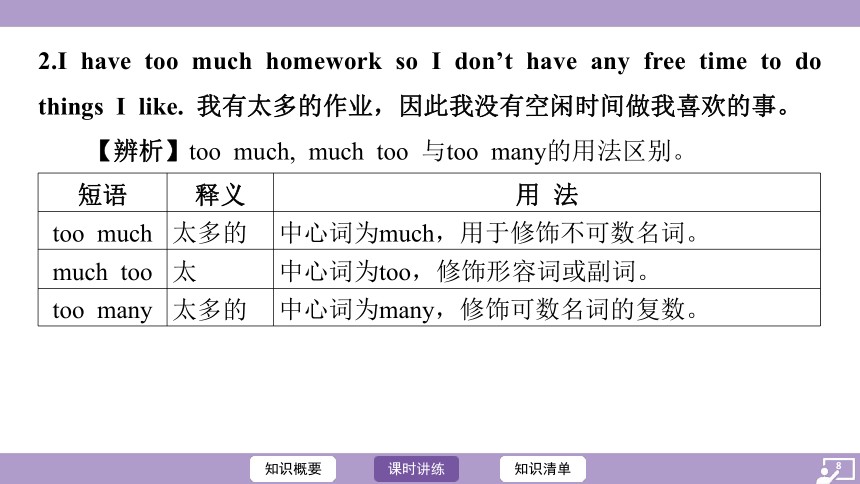
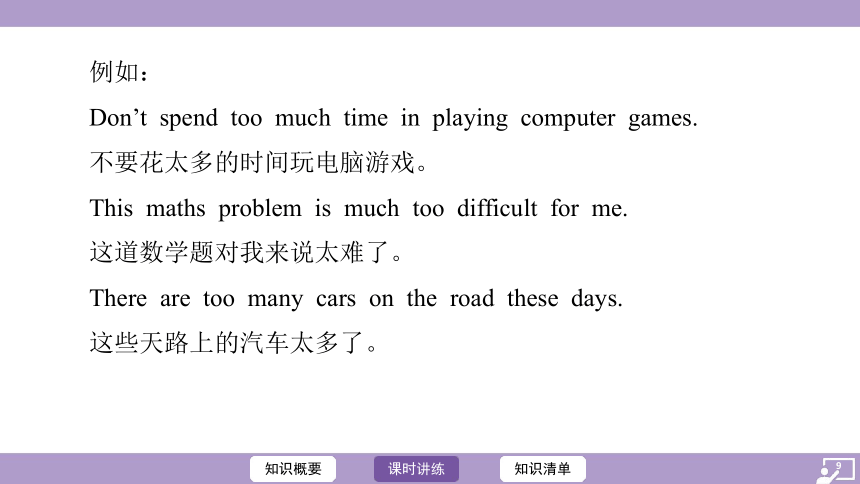
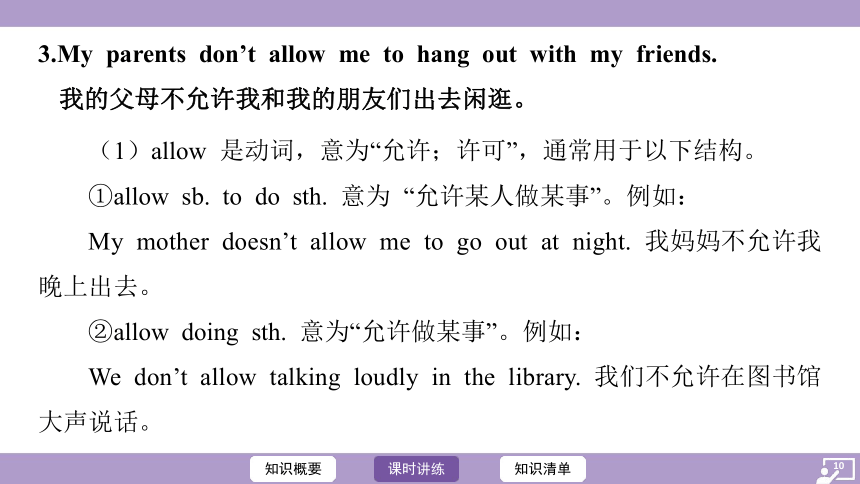
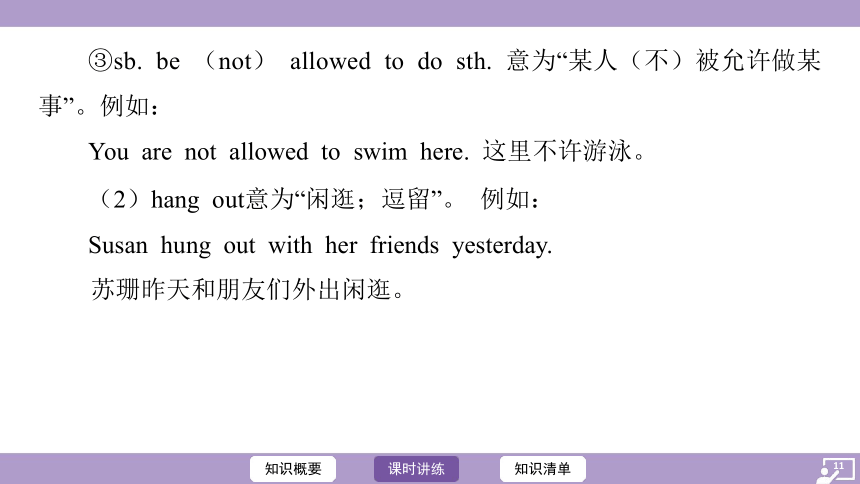
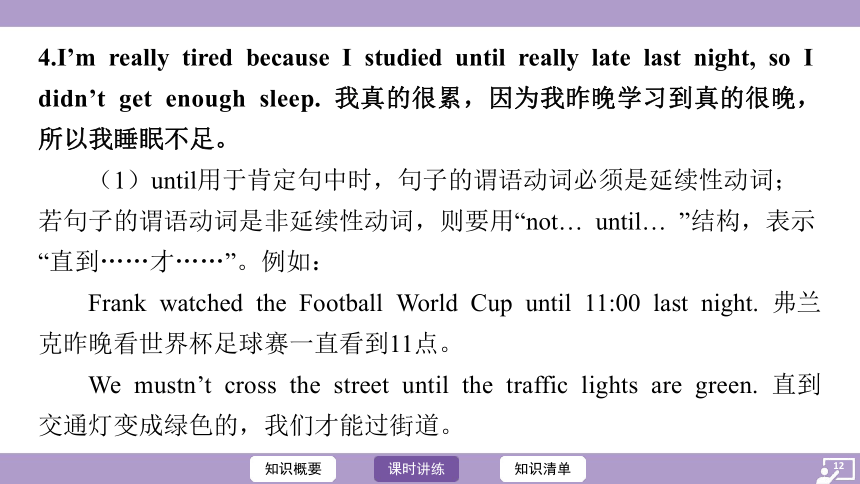
文档简介
(共34张PPT)
Unit 4 Why don’t you talk to
your parents
Unit 4 Why don’t you talk to your parents
课时讲练
Section A (第一、二课时)
1.Why don’t you talk to your parents 你为什么不和你父母谈谈呢?
Why don’t you go to sleep earlier this evening 为什么今晚你不早点儿去睡呢?
(1)“Why don’t you… ”=“Why not… ”,意为“为什么不……?”,后面接动词原形。该句型用于给对方提建议。用“Why don’t you do sth. ”提建议显得更委婉,更容易被对方接受。
回答对方的建议:
①同意对方的建议时的回答:
Good idea. / That’s a good idea. 好主意。
OK. / All right. / Great. 好。/ 行。/太好了。
I agree with you. 我同意你的看法。
No problem. 没问题。
Yes, I think so. 对,我也这样想。
②不同意对方的建议时的回答:
I don’t think so. 我认为不是这样。
Sorry, I can’t. 对不起,我不能。
I’d love to, but… 我愿意,但……
I’m afraid… 恐怕……
【拓展】表示建议的其他句型:
①“What / How about doing… ” “做……怎么样?”。例如:
What/ How about going to see a film 去看电影怎么样
②“Let’s do…!” “让我们做……吧!”。例如:
Let’s play volleyball after school! 放学后让我们一起打排球吧!
③“Shall we do… ” “我们做……好吗?”。例如:
Shall we go climbing this weekend?我们这个周末去爬山好吗
④You had better (not) do sth. “你最好做(不做)某事”。例如:
You’d better be careful when you cross the road. 你过马路时最好小心点。
⑤“Would you like / love to do… ”“你想要做……吗?”。例如:
—Would you like / love to go to the concert with us this evening 今晚你愿意和我们一起去听演唱会吗?
—Yes, I’d like / love to. 是的,我很乐意去。
(2)talk to sb. 意为“同某人谈话”。例如:
She should talk to her friend so that she can say she’s sorry. 她应该跟朋友谈谈,以便她能说声对不起。
2.I have too much homework so I don’t have any free time to do things I like. 我有太多的作业,因此我没有空闲时间做我喜欢的事。
【辨析】too much, much too 与too many的用法区别。
短语 释义 用 法
too much 太多的 中心词为much,用于修饰不可数名词。
much too 太 中心词为too,修饰形容词或副词。
too many 太多的 中心词为many,修饰可数名词的复数。
例如:
Don’t spend too much time in playing computer games.
不要花太多的时间玩电脑游戏。
This maths problem is much too difficult for me.
这道数学题对我来说太难了。
There are too many cars on the road these days.
这些天路上的汽车太多了。
3.My parents don’t allow me to hang out with my friends.
我的父母不允许我和我的朋友们出去闲逛。
(1)allow 是动词,意为“允许;许可”,通常用于以下结构。
①allow sb. to do sth. 意为 “允许某人做某事”。例如:
My mother doesn’t allow me to go out at night. 我妈妈不允许我晚上出去。
②allow doing sth. 意为“允许做某事”。例如:
We don’t allow talking loudly in the library. 我们不允许在图书馆大声说话。
③sb. be (not) allowed to do sth. 意为“某人(不)被允许做某事”。例如:
You are not allowed to swim here. 这里不许游泳。
(2)hang out意为“闲逛;逗留”。 例如:
Susan hung out with her friends yesterday.
苏珊昨天和朋友们外出闲逛。
4.I’m really tired because I studied until really late last night, so I didn’t get enough sleep. 我真的很累,因为我昨晚学习到真的很晚,所以我睡眠不足。
(1)until用于肯定句中时,句子的谓语动词必须是延续性动词;若句子的谓语动词是非延续性动词,则要用“not… until… ”结构,表示“直到……才……”。例如:
Frank watched the Football World Cup until 11:00 last night. 弗兰克昨晚看世界杯足球赛一直看到11点。
We mustn’t cross the street until the traffic lights are green. 直到交通灯变成绿色的,我们才能过街道。
【注意】连词until意为“直到……为止;到……时”,引导时间状语从句,常放在主句之后,也可以放在主句之前。主句为一般将来时,从句要用一般现在时表示将来。例如:
I won ’t believe it until I see it with my own eyes. 直到亲眼看见,我才会相信。
(2)当not until位于句首时,主句要倒装。例如:
Not until 2023 did he return to his hometown. 直到 2023年他才回到家乡。
5.Well, you should call him so that you can say you’re sorry.
哦,你应该给他打电话以便你能说声对不起。
so that的用法。
(1)引导目的状语从句。so that 意为“以便;为的是”时,引导目的状语从句,一般放在主句之后,且不用逗号隔开。目的状语从句表示动机(即一种可能性),而非事实。此时可与in order that 换用;从句中常含有情态动词 may, can/could, should, would 等。例如:
Please answer the question in a loud enough voice so that all the class may hear. 请用足够大的声音回答问题,以便全班都能听到。
(2)引导结果状语从句。so that 意为“以至于;结果”时,引导结果状语从句,陈述的是客观事实,常常不带情态动词。主从句之间可以用逗号隔开。此时不能与in order that 换用。例如:
Linda didn’t plan her time well, so that she didn’t finish her work on time. 琳达没有把时间计划好,所以没能按时完成工作。
7.Instead he watches whatever he wants until late at night. 相反,
他却可以看他喜欢的任何节目,一直看到很晚。
(1)instead的用法。
①instead位于句首,表示“反而;相反”,是副词,后面不接其他的词,在句首时常用逗号隔开,表示前面的事没做,而做了后面的事。例如:
I didn’t go to see a movie last night. Instead, I watched a volleyball match on TV. 昨晚我没去看电影,而是在电视上看了一场排球比赛。
②instead位于句尾,表示“作为代替,而是”。例如:
If you can’t go to take part in the activity, I can go instead. 如果你不能去参加这个活动,我可以代替你去。
③instead of是介词短语,意为“代替;而不是”,后跟名词、代词、动词-ing形式。例如:
She went to the museum instead of going to the library. 她去了博物馆而不是图书馆。
(2)句中whatever引导一个宾语从句,作动词watches的宾语。whatever 意为“无论什么”。例如:
You can take whatever you like. 你喜欢什么就拿什么。
【拓展】whatever还可以引导让步状语从句,相当于no matter what,意为“无论什么,不管什么”。例如:
Whatever the problems are, never give up!无论有什么问题,永远不要放弃!
8.I don’t think this is fair. 我认为这不公平。
“I don’t think+(that)宾语从句”表示“我认为……不……”,that在宾语从句中起引导作用,无意义,常可省略。从形式上看don’t否定的是主句的谓语动词think,但在意义上否定的是从句的谓语动词,这叫作“否定转移”。例如:
I don’t think she can play the piano. 我认为她不会弹钢琴。
【拓展】当think, believe, expect, suppose, imagine等词后跟宾语从句,且主句的主语是第一人称I或we时,从句若要表达否定意义,则将否定词转移到主句上,而从句用肯定形式。例如:
I don’t believe he can work out the problem. 我相信他解不出这个问题。
9.If your parents are having problems, you should offer to help. 如果你的父母遇到问题,你应该提供帮助。
offer是动词,意为“主动提出;自愿给予”。常用的结构如下。
(1)offer to do sth. 意为“愿意(做某事);主动提出做某事”。例如:Daming often gives his seat to the old on the bus. 在公共汽车上大明经常把他的座位让给老年人。
(2)offer sb. sth. = offer sth. to sb. ,意为“向某人提供某物”。例如:
She offered me a cup of tea. =She offered a cup of tea to me. 她给了我一杯茶。
一、单项选择。
( ) 1.— ______
—My watch doesn’t work.
C
A.How did that happen B.What’s that C.What’s wrong
( ) 2.Why not ________climbing with us in the park
A
A.go B.to go C.going
( ) 3.________ Eric is only nine years old, he knows a lot.
B
A.Because B.Though C.While
( ) 4.My father didn’t go to bed ________ he finished his work
last night.
C
A.if B.when C.until
( ) 5.Miss Wang speaks very loudly ________ all the students can
hear her.
B
A.in order to B.so that C.such that
( ) 6.My teacher doesn’t allow us ________ others’ homework.
C
A.copy B.copying C.to copy
( ) 7.Giving ________ pressure is not good for children.
B
A.much too B.too much C.too many
小锦囊 pressure为不可数名词,要用too much还是too many修饰
( ) 8.We have no milk. Let’s have apple juice ________.
A
A.instead B.besides C.yet
( ) 9.—How are you ________ with your classmates
—Very well.
C
A.getting in B.getting off C.getting on
( ) 10.Frank offered ________ me with my maths last Saturday.
A
A.to help B.help C.helping
小锦囊 offer to do sth. 用于表示主动提出做某事。
二、根据汉语提示,写出正确的单词完成句子。
1.Sally often ______(提供) to give her seat to old men on the bus.
2.Don’t lose heart _________(无论什么) difficulties you meet.
3.You can borrow this book from the library,but you must _______
(归还) it on time.
4.The ________(关系) between the countries is very good.
5.There’s something _______(有问题的) with her ears, so she can’t
hear anything.
offers
whatever
return
relation
wrong
6.—Does your brother often______(争吵) with others
—No, he is very nice to others.
argue
7.Can you ______(猜测) the meaning of the new word
8.Helen is always________(紧张的) when she makes a speech in public.
9.I didn’t go to the meeting yesterday. Miss Li went to the meeting
_______(代替).
10.Body language is a very powerful tool of ______________(交流).
guess
nervous
instead
communication
三、用括号内所给单词的适当形式填空。
1.Dick is my ______(old) brother. He is three years older than I.
2.It’s _______(cloud) today. It seems that it is going to rain.
3.My best friend always offers ________(help) me.
4.I think the ______________(communicate) between friends is useful.
5._________(copy) others’ homework is not right.
elder
cloudy
to help
communication
Copying
6.They are________(worry) about making future plans.
7.His father doesn’t allow him ______(go) swimming alone.
8.Why not_____(have) a picnic this afternoon
9.I want to play soccer instead of _________(watch) TV.
10.I found a girl _______(cry) when I passed the corner.
worried
to go
have
watching
crying
四、从方框中选出恰当的选项,补全对话。有一项多余。
A: Welcome back to “The Problem Line”. Okay, it’s time for another call. _1.(____)
B: Hello! This i Mandy.
C
A. What should I do
B. You shouldn’t argue with your mom.
C. Hello,who’s calling
D. I think Mandy should ask her teacher for help.
E. Why not have a good talk with her
F. What’s your problem
B: I know, but she plans everything for me. I can’t even decide what
to wear on weekends.
A: Hi, Mandy. Welcome to “The Problem Line”. _2.(____)
B: Well, I’m having problems with my mom. When we talk about something, we always argue.
A: _3.(____) It is not right.
F
B
A. What should I do
B. You shouldn’t argue with your mom.
C. Hello,who’s calling
D. I think Mandy should ask her teacher for help.
E. Why not have a good talk with her
F. What’s your problem
A: That’s too bad. _4.(____)
B: I tried, but she never listened. She thinks I should listen to her because I’m her child.
A: Well, that’s a difficult problem. Dear listeners,who can give her suggestions
C: Hello, this is Victor. _5.(____) Maybe her mother will listen to her teacher.
B: OK. I’ll have a try. Thank you!
E
D
A. What should I do
B. You shouldn’t argue with your mom.
C. Hello,who’s calling
D. I think Mandy should ask her teacher for help.
E. Why not have a good talk with her
F. What’s your problem
五、从方框内选择适当的单词,并用其正确形式填空。每个单词只
能用一次。
offer why explain between proper however communicate
whatever nervous hang
Dear Mr. Hunt,
My problem is that I can’t get on with my family. Relations
1. . my parents have become difficult. They argued a lot,and I really don’t like it. It’s the only 2. . they have. I don’t know if I should say anything to them about this. When they argue, it’s like a big, black cloud 3. . over our home.
between
communication
hanging
Also, my elder brother is not very nice to me. He always refuses to let me watch my favorite TV show. Instead he watches 4. . he wants until late at night. I don’t think this is fair. At home I always feel lonely and 5. .. Is that normal What can I do
Sad and Thirteen
Dear Sad and Thirteen,
It’s not easy being your age, and it’s normal to have these feelings. 6. . don’t you talk about these feelings with your family
whatever
nervous
offer why explain between proper however communicate
whatever nervous hang
Why
If your parents are having problems, you should 7. . to help. Maybe you could do more jobs around the house so that they have more time for munication. Secondly, why don’t you sit down and communicate with your brother You should 9. . that you don’t mind him watching TV all the time. 10. ., he should let you watch your favorite show. I hope things will be better for you soon.
Robert Hunt
offer
proper
explain
However
offer why explain between proper however communicate
whatever nervous hang
Unit 4 Why don’t you talk to
your parents
Unit 4 Why don’t you talk to your parents
课时讲练
Section A (第一、二课时)
1.Why don’t you talk to your parents 你为什么不和你父母谈谈呢?
Why don’t you go to sleep earlier this evening 为什么今晚你不早点儿去睡呢?
(1)“Why don’t you… ”=“Why not… ”,意为“为什么不……?”,后面接动词原形。该句型用于给对方提建议。用“Why don’t you do sth. ”提建议显得更委婉,更容易被对方接受。
回答对方的建议:
①同意对方的建议时的回答:
Good idea. / That’s a good idea. 好主意。
OK. / All right. / Great. 好。/ 行。/太好了。
I agree with you. 我同意你的看法。
No problem. 没问题。
Yes, I think so. 对,我也这样想。
②不同意对方的建议时的回答:
I don’t think so. 我认为不是这样。
Sorry, I can’t. 对不起,我不能。
I’d love to, but… 我愿意,但……
I’m afraid… 恐怕……
【拓展】表示建议的其他句型:
①“What / How about doing… ” “做……怎么样?”。例如:
What/ How about going to see a film 去看电影怎么样
②“Let’s do…!” “让我们做……吧!”。例如:
Let’s play volleyball after school! 放学后让我们一起打排球吧!
③“Shall we do… ” “我们做……好吗?”。例如:
Shall we go climbing this weekend?我们这个周末去爬山好吗
④You had better (not) do sth. “你最好做(不做)某事”。例如:
You’d better be careful when you cross the road. 你过马路时最好小心点。
⑤“Would you like / love to do… ”“你想要做……吗?”。例如:
—Would you like / love to go to the concert with us this evening 今晚你愿意和我们一起去听演唱会吗?
—Yes, I’d like / love to. 是的,我很乐意去。
(2)talk to sb. 意为“同某人谈话”。例如:
She should talk to her friend so that she can say she’s sorry. 她应该跟朋友谈谈,以便她能说声对不起。
2.I have too much homework so I don’t have any free time to do things I like. 我有太多的作业,因此我没有空闲时间做我喜欢的事。
【辨析】too much, much too 与too many的用法区别。
短语 释义 用 法
too much 太多的 中心词为much,用于修饰不可数名词。
much too 太 中心词为too,修饰形容词或副词。
too many 太多的 中心词为many,修饰可数名词的复数。
例如:
Don’t spend too much time in playing computer games.
不要花太多的时间玩电脑游戏。
This maths problem is much too difficult for me.
这道数学题对我来说太难了。
There are too many cars on the road these days.
这些天路上的汽车太多了。
3.My parents don’t allow me to hang out with my friends.
我的父母不允许我和我的朋友们出去闲逛。
(1)allow 是动词,意为“允许;许可”,通常用于以下结构。
①allow sb. to do sth. 意为 “允许某人做某事”。例如:
My mother doesn’t allow me to go out at night. 我妈妈不允许我晚上出去。
②allow doing sth. 意为“允许做某事”。例如:
We don’t allow talking loudly in the library. 我们不允许在图书馆大声说话。
③sb. be (not) allowed to do sth. 意为“某人(不)被允许做某事”。例如:
You are not allowed to swim here. 这里不许游泳。
(2)hang out意为“闲逛;逗留”。 例如:
Susan hung out with her friends yesterday.
苏珊昨天和朋友们外出闲逛。
4.I’m really tired because I studied until really late last night, so I didn’t get enough sleep. 我真的很累,因为我昨晚学习到真的很晚,所以我睡眠不足。
(1)until用于肯定句中时,句子的谓语动词必须是延续性动词;若句子的谓语动词是非延续性动词,则要用“not… until… ”结构,表示“直到……才……”。例如:
Frank watched the Football World Cup until 11:00 last night. 弗兰克昨晚看世界杯足球赛一直看到11点。
We mustn’t cross the street until the traffic lights are green. 直到交通灯变成绿色的,我们才能过街道。
【注意】连词until意为“直到……为止;到……时”,引导时间状语从句,常放在主句之后,也可以放在主句之前。主句为一般将来时,从句要用一般现在时表示将来。例如:
I won ’t believe it until I see it with my own eyes. 直到亲眼看见,我才会相信。
(2)当not until位于句首时,主句要倒装。例如:
Not until 2023 did he return to his hometown. 直到 2023年他才回到家乡。
5.Well, you should call him so that you can say you’re sorry.
哦,你应该给他打电话以便你能说声对不起。
so that的用法。
(1)引导目的状语从句。so that 意为“以便;为的是”时,引导目的状语从句,一般放在主句之后,且不用逗号隔开。目的状语从句表示动机(即一种可能性),而非事实。此时可与in order that 换用;从句中常含有情态动词 may, can/could, should, would 等。例如:
Please answer the question in a loud enough voice so that all the class may hear. 请用足够大的声音回答问题,以便全班都能听到。
(2)引导结果状语从句。so that 意为“以至于;结果”时,引导结果状语从句,陈述的是客观事实,常常不带情态动词。主从句之间可以用逗号隔开。此时不能与in order that 换用。例如:
Linda didn’t plan her time well, so that she didn’t finish her work on time. 琳达没有把时间计划好,所以没能按时完成工作。
7.Instead he watches whatever he wants until late at night. 相反,
他却可以看他喜欢的任何节目,一直看到很晚。
(1)instead的用法。
①instead位于句首,表示“反而;相反”,是副词,后面不接其他的词,在句首时常用逗号隔开,表示前面的事没做,而做了后面的事。例如:
I didn’t go to see a movie last night. Instead, I watched a volleyball match on TV. 昨晚我没去看电影,而是在电视上看了一场排球比赛。
②instead位于句尾,表示“作为代替,而是”。例如:
If you can’t go to take part in the activity, I can go instead. 如果你不能去参加这个活动,我可以代替你去。
③instead of是介词短语,意为“代替;而不是”,后跟名词、代词、动词-ing形式。例如:
She went to the museum instead of going to the library. 她去了博物馆而不是图书馆。
(2)句中whatever引导一个宾语从句,作动词watches的宾语。whatever 意为“无论什么”。例如:
You can take whatever you like. 你喜欢什么就拿什么。
【拓展】whatever还可以引导让步状语从句,相当于no matter what,意为“无论什么,不管什么”。例如:
Whatever the problems are, never give up!无论有什么问题,永远不要放弃!
8.I don’t think this is fair. 我认为这不公平。
“I don’t think+(that)宾语从句”表示“我认为……不……”,that在宾语从句中起引导作用,无意义,常可省略。从形式上看don’t否定的是主句的谓语动词think,但在意义上否定的是从句的谓语动词,这叫作“否定转移”。例如:
I don’t think she can play the piano. 我认为她不会弹钢琴。
【拓展】当think, believe, expect, suppose, imagine等词后跟宾语从句,且主句的主语是第一人称I或we时,从句若要表达否定意义,则将否定词转移到主句上,而从句用肯定形式。例如:
I don’t believe he can work out the problem. 我相信他解不出这个问题。
9.If your parents are having problems, you should offer to help. 如果你的父母遇到问题,你应该提供帮助。
offer是动词,意为“主动提出;自愿给予”。常用的结构如下。
(1)offer to do sth. 意为“愿意(做某事);主动提出做某事”。例如:Daming often gives his seat to the old on the bus. 在公共汽车上大明经常把他的座位让给老年人。
(2)offer sb. sth. = offer sth. to sb. ,意为“向某人提供某物”。例如:
She offered me a cup of tea. =She offered a cup of tea to me. 她给了我一杯茶。
一、单项选择。
( ) 1.— ______
—My watch doesn’t work.
C
A.How did that happen B.What’s that C.What’s wrong
( ) 2.Why not ________climbing with us in the park
A
A.go B.to go C.going
( ) 3.________ Eric is only nine years old, he knows a lot.
B
A.Because B.Though C.While
( ) 4.My father didn’t go to bed ________ he finished his work
last night.
C
A.if B.when C.until
( ) 5.Miss Wang speaks very loudly ________ all the students can
hear her.
B
A.in order to B.so that C.such that
( ) 6.My teacher doesn’t allow us ________ others’ homework.
C
A.copy B.copying C.to copy
( ) 7.Giving ________ pressure is not good for children.
B
A.much too B.too much C.too many
小锦囊 pressure为不可数名词,要用too much还是too many修饰
( ) 8.We have no milk. Let’s have apple juice ________.
A
A.instead B.besides C.yet
( ) 9.—How are you ________ with your classmates
—Very well.
C
A.getting in B.getting off C.getting on
( ) 10.Frank offered ________ me with my maths last Saturday.
A
A.to help B.help C.helping
小锦囊 offer to do sth. 用于表示主动提出做某事。
二、根据汉语提示,写出正确的单词完成句子。
1.Sally often ______(提供) to give her seat to old men on the bus.
2.Don’t lose heart _________(无论什么) difficulties you meet.
3.You can borrow this book from the library,but you must _______
(归还) it on time.
4.The ________(关系) between the countries is very good.
5.There’s something _______(有问题的) with her ears, so she can’t
hear anything.
offers
whatever
return
relation
wrong
6.—Does your brother often______(争吵) with others
—No, he is very nice to others.
argue
7.Can you ______(猜测) the meaning of the new word
8.Helen is always________(紧张的) when she makes a speech in public.
9.I didn’t go to the meeting yesterday. Miss Li went to the meeting
_______(代替).
10.Body language is a very powerful tool of ______________(交流).
guess
nervous
instead
communication
三、用括号内所给单词的适当形式填空。
1.Dick is my ______(old) brother. He is three years older than I.
2.It’s _______(cloud) today. It seems that it is going to rain.
3.My best friend always offers ________(help) me.
4.I think the ______________(communicate) between friends is useful.
5._________(copy) others’ homework is not right.
elder
cloudy
to help
communication
Copying
6.They are________(worry) about making future plans.
7.His father doesn’t allow him ______(go) swimming alone.
8.Why not_____(have) a picnic this afternoon
9.I want to play soccer instead of _________(watch) TV.
10.I found a girl _______(cry) when I passed the corner.
worried
to go
have
watching
crying
四、从方框中选出恰当的选项,补全对话。有一项多余。
A: Welcome back to “The Problem Line”. Okay, it’s time for another call. _1.(____)
B: Hello! This i Mandy.
C
A. What should I do
B. You shouldn’t argue with your mom.
C. Hello,who’s calling
D. I think Mandy should ask her teacher for help.
E. Why not have a good talk with her
F. What’s your problem
B: I know, but she plans everything for me. I can’t even decide what
to wear on weekends.
A: Hi, Mandy. Welcome to “The Problem Line”. _2.(____)
B: Well, I’m having problems with my mom. When we talk about something, we always argue.
A: _3.(____) It is not right.
F
B
A. What should I do
B. You shouldn’t argue with your mom.
C. Hello,who’s calling
D. I think Mandy should ask her teacher for help.
E. Why not have a good talk with her
F. What’s your problem
A: That’s too bad. _4.(____)
B: I tried, but she never listened. She thinks I should listen to her because I’m her child.
A: Well, that’s a difficult problem. Dear listeners,who can give her suggestions
C: Hello, this is Victor. _5.(____) Maybe her mother will listen to her teacher.
B: OK. I’ll have a try. Thank you!
E
D
A. What should I do
B. You shouldn’t argue with your mom.
C. Hello,who’s calling
D. I think Mandy should ask her teacher for help.
E. Why not have a good talk with her
F. What’s your problem
五、从方框内选择适当的单词,并用其正确形式填空。每个单词只
能用一次。
offer why explain between proper however communicate
whatever nervous hang
Dear Mr. Hunt,
My problem is that I can’t get on with my family. Relations
1. . my parents have become difficult. They argued a lot,and I really don’t like it. It’s the only 2. . they have. I don’t know if I should say anything to them about this. When they argue, it’s like a big, black cloud 3. . over our home.
between
communication
hanging
Also, my elder brother is not very nice to me. He always refuses to let me watch my favorite TV show. Instead he watches 4. . he wants until late at night. I don’t think this is fair. At home I always feel lonely and 5. .. Is that normal What can I do
Sad and Thirteen
Dear Sad and Thirteen,
It’s not easy being your age, and it’s normal to have these feelings. 6. . don’t you talk about these feelings with your family
whatever
nervous
offer why explain between proper however communicate
whatever nervous hang
Why
If your parents are having problems, you should 7. . to help. Maybe you could do more jobs around the house so that they have more time for munication. Secondly, why don’t you sit down and communicate with your brother You should 9. . that you don’t mind him watching TV all the time. 10. ., he should let you watch your favorite show. I hope things will be better for you soon.
Robert Hunt
offer
proper
explain
However
offer why explain between proper however communicate
whatever nervous hang
同课章节目录
- Unit 1 What's the matter?
- Section A
- Section B
- Unit 2 I'll help to clean up the city parks.
- Section A
- Section B
- Unit 3 Could you please clean your room?
- Section A
- Section B
- Unit 4 Why don't you talk to your parents?
- Section A
- Section B
- Unit 5 What were you doing when the rainstorm came
- Section A
- Section B
- Review of Units 1-5
- Unit 6 An old man tried to move the mountains.
- Section A
- Section B
- Unit 7 What's the highest mountain in the world?
- Section A
- Section B
- Unit 8 Have you read Treasure Island yet?
- Section A
- Section B
- Unit 9 Have you ever been to a museum?
- Section A
- Section B
- Unit 10 I've had this bike for three years.
- Section A
- Section B
